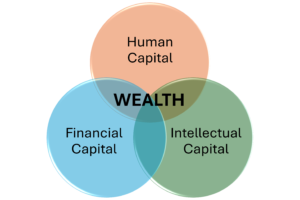Money is often a sensitive topic, one that many shy away from discussing, even with their own families. However, by engaging in open conversations about wealth and money with our children, we can empower them to understand and manage it effectively. Without this knowledge, wealth can easily slip through their fingers. To initiate these discussions, we must first redefine what wealth truly means.
A report from Kiplinger showed that “68% of America’s most affluent people do not consider themselves wealthy.” If you ask someone if they are wealthy, they usually say, “I’m not wealthy. But my neighbor, who has much more than I do, is now wealthy.” However, if you ask the neighbor, he may not feel wealthy either.
The problem is that we often define wealth only by dollar amounts or assets. For example, most Americans believe that you are considered wealthy if you have over $2.2 million. However, wealth should be much more than money.
We should redefine wealth to be all types of capital. Capital is defined as anything that confers value or benefit to its owner. We should define wealth as financial capital, human capital, and intellectual capital.

1: Financial capital is your savings, investments, real estate, and other property.
2: Human capital is your physical and emotional well-being.
3: Intellectual capital is your knowledge, skills, and experience.
If you use financial capital, it should only be used to improve your human or intellectual capital. Using financial capital for other purposes doesn’t help us improve who we are.
With young children, we can use this definition of wealth to help them make decisions about purchases they are considering. With older children, it can help open the conversation about potential inheritance and how it should be handled.
If we redefine wealth to include financial, human, and intellectual capital, the conversation changes. It is no longer just about money but about the impact that money can have. In this framework, passing on “wealth” means so much more than just money. Are you wealthy?
Source: https://www.kiplinger.com/investing/wealth-management/richest-americans-dont-feel-wealthy




